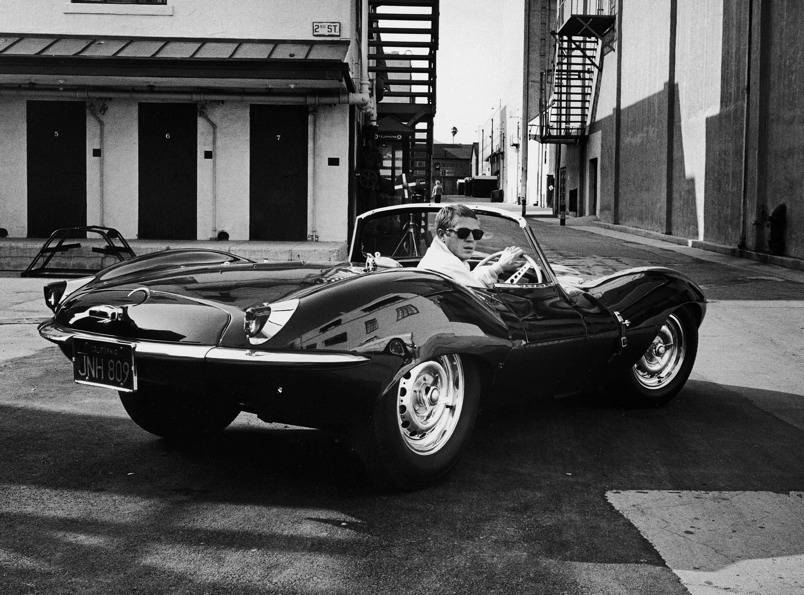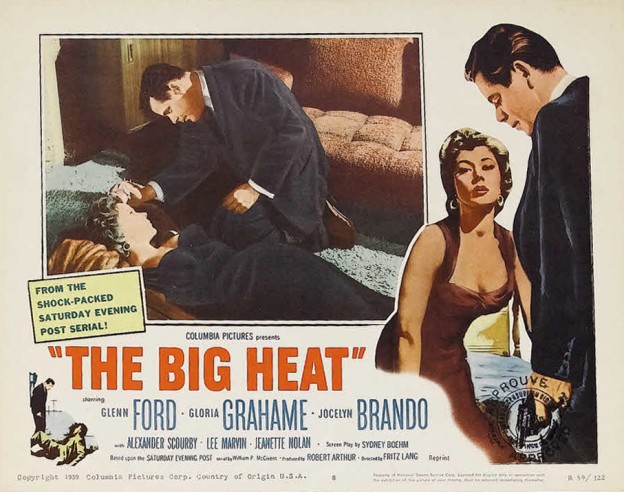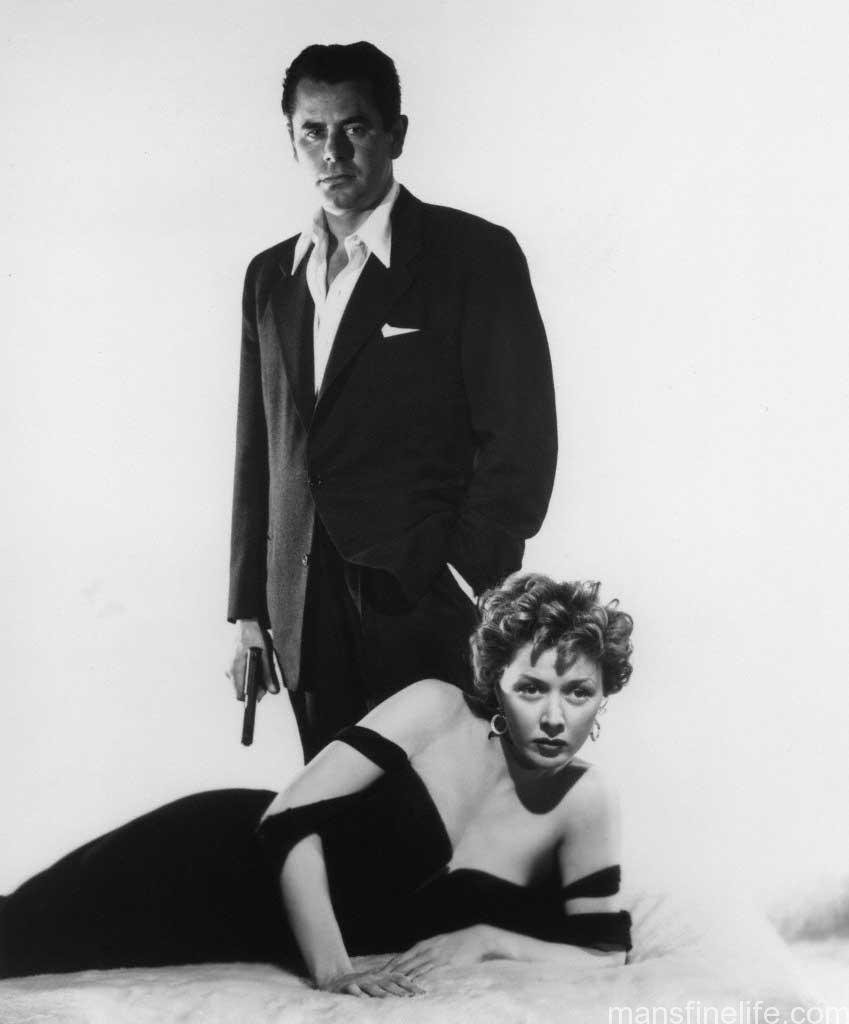If you’re looking for the precursor to Dirty Harry and a thousand other righteous vigilante cops in the cinema look no further than Fritz Lang‘s 1953 film noir masterpiece, The Big Heat. Starring the underrated Glenn Ford as crusading homicide detective Dave Bannion, The Big Heat unspools like an Eisenhower-era nightmare, peeling away the veneer of wholesomeness from a mid-sized metropolis to reveal the festering corruption beneath. With bracingly modern use of brutal violence, Heat is one of Lang’s top crime masterpieces in a career filled with them, and the film still retains its power to shock and disturb today. Like so much of the Austrian genius’ output, which includes genre-defining classics like Metropolis, M, Fury and Scarlet Street, the phrase “ahead of its time” sticks to the The Big Heat. No matter how many times you’ve viewed it, you’ll come away astonished at the remarkable moral distance the film has traveled from start to finish.
While investigating a colleague’s alleged suicide and after talking to the seemingly bereaved widow, Ford’s Detective Bannion is contacted by the dead man’s mistress who reveals that not only was he keeping her on the side but that he was living far beyond the means of a policeman’s salary. After returning to push for answers from the now chilly dead cop’s wife, Bannion is then told to back off by his lieutenant. But when the mistress is found murdered, her body covered with cigarette burns, and O’Bannion begins receiving threatening calls at his home, he goes to the house of the local organized crime figure and Mr. Big, Mike Laguna (played by legendary voice actor Alexander Scourby), to confront him. Laguna offers to buy Bannion off but the straight arrow cop will have none of it. Seeing that Bannion cannot be deterred by the usual methods, the mob plans to murder Bannion by rigging his car to blow up. But when his wife ends up turning the ignition instead and his department continues to stonewall him, Bannion resigns from the force to begin a one-man crusade against Laguna and his fellow “thieves”.
Chief among those accomplices is Laguna’s enforcer, Vince Stone. Played to vicious perfection by the great Lee Marvin, at the peak of his early career powers when he was one of the most badass “heavies” in the movies, Marvin’s Stone is a pure psychopath capable of truly terrifying acts of sudden violence, especially against women. When Bannion sees Stone put out his cigarette on the hand of a woman who has displeased him at a club, all sorts of alarm bells go off. He confronts Stone and forces him to back down, impressing Stone’s girlfriend, Debby Marsh (played by the sexy, funny and always fascinating Gloria Grahame). But Debby’s wisecracking ways and admiration for Bannion’s bravery in pushing back against Vince get her into awful trouble with the unstable Stone almost immediately. The rest of the plot would be all spoilers from here so better just to watch for yourself and see how it unfolds. Suffice to say Debby Marsh is forced to flee to Dave Bannion for protection and solace and the two wounded people, one disfigured by hatred and loss and one disfigured physically, join forces to bring down a criminal racket that has destroyed their lives and is destroying their town.
With sumptuous black and white cinematography by the highly accomplished Charles Lang (no relation to the director), The Big Heat moves through its 89 minutes like a predatory cat, punctuated by short bursts of violence sharp as a samurai sword. There isn’t an ounce of fat on it and this is one of those movies where you can’t quite believe how far down the rabbit hole you’re being taken the first time you see it. Like so many of Fritz Lang’s films, he plumbs the depths of human depravity but also the red lines that even ostensibly good people can cross when pushed too far by fate and circumstance. And in Heat, Lang has arguably his best ever cast. Lee Marvin’s Vince Stone, much like Richard Widmark’s giggling sociopath in Henry Hathaway’s 1947 Kiss of Death, made such a major impact with audiences that it essentially launched his career. There are very few actors who bring an authentic sense of unpredictable violence and menace to the screen. Marvin, a decorated combat veteran with the Marines in the Pacific Theater during WWII, was certainly one of them. Gloria Grahame is always terrific with her sly, almost-lisping voice and unconventional beauty paired with readily evident intelligence. And Debby Marsh is probably her best role. From superficial party girl to vengeful victim, her emotional arc is incredibly challenging and Grahame brings it off spectacularly well, all the while earning the viewer’s sympathy for her traumatic journey.
And then there’s Glenn Ford. Somewhat overlooked today, Ford is one of the more intriguing leading men of post-War Hollywood. With his standard-issue good looks and expressively masculine voice, Ford could have easily been simple arm candy for the leading ladies of the time, as Columbia seemed to want to make him by pairing him with Rita Hayworth so frequently. But he had a unique knack for capturing the uneasy tension of an ordinary man forced by desperate circumstances into danger and intrigue. Under pressure, his apparent blandness was quickly revealed to be a facade barely covering up a violent need to mete out a very personal, very hands-on sort of justice. It’s not hard to see a greater metaphor for America after World War II in Ford’s seminal roles as simple, decent men forced to retaliate against powerful, oppressive enemies with remorselessness and brutality. He was an actor perfectly suited to noir and the revenge Western and for deceptively complicated characters with hidden traits of angst, obsession and even hatred. In Lang’s brilliant film noir, Ford’s Dave Bannion confronts a morally decaying world that compels him to tap into previously unimagined reserves of violence and retribution in a lonely attempt to reimpose a lost order with no quarter asked or given. If there’s a movie that brought the logical aftermath of Total War to the crime drama it’s got be The Big Heat. Some 60 years after it was first released it still leaves a mark as searing as a lit cigarette to the face.




